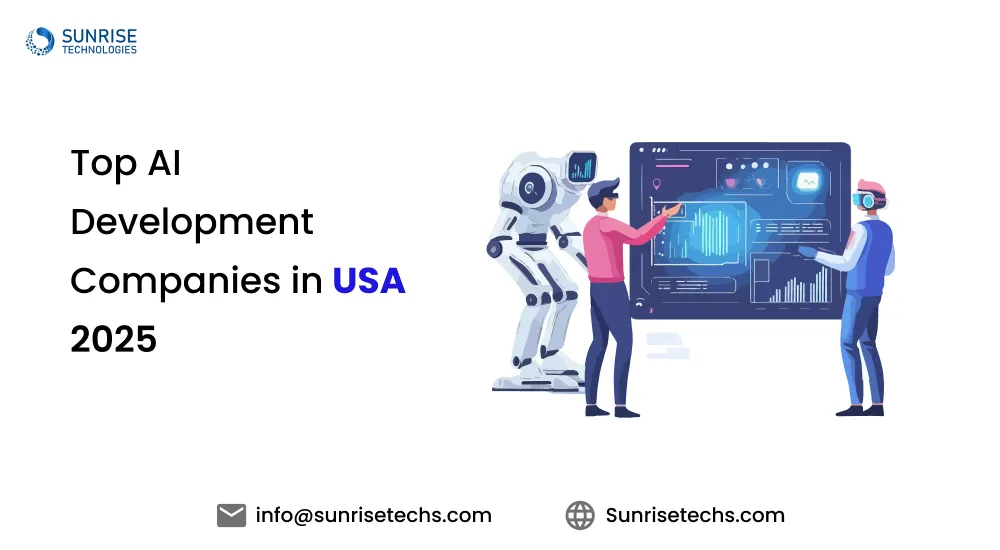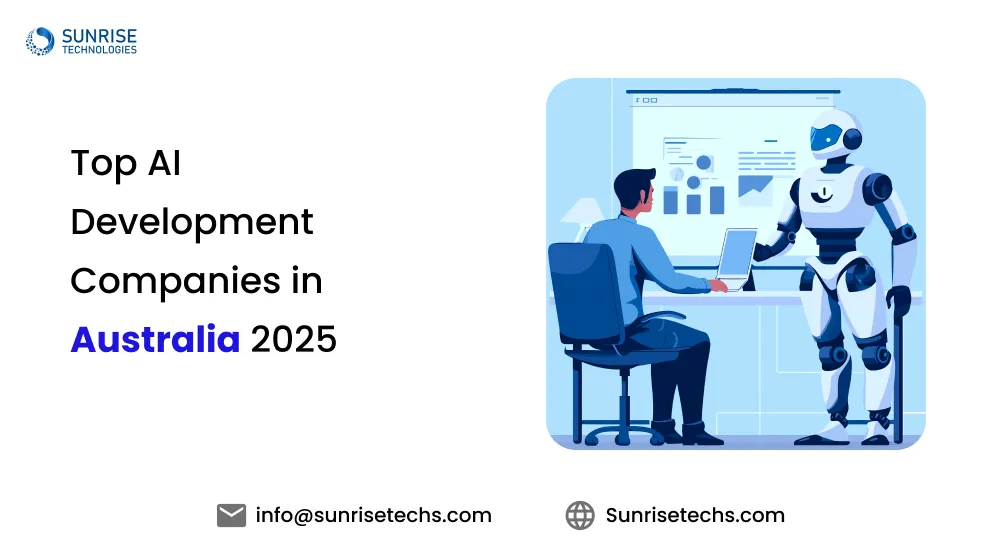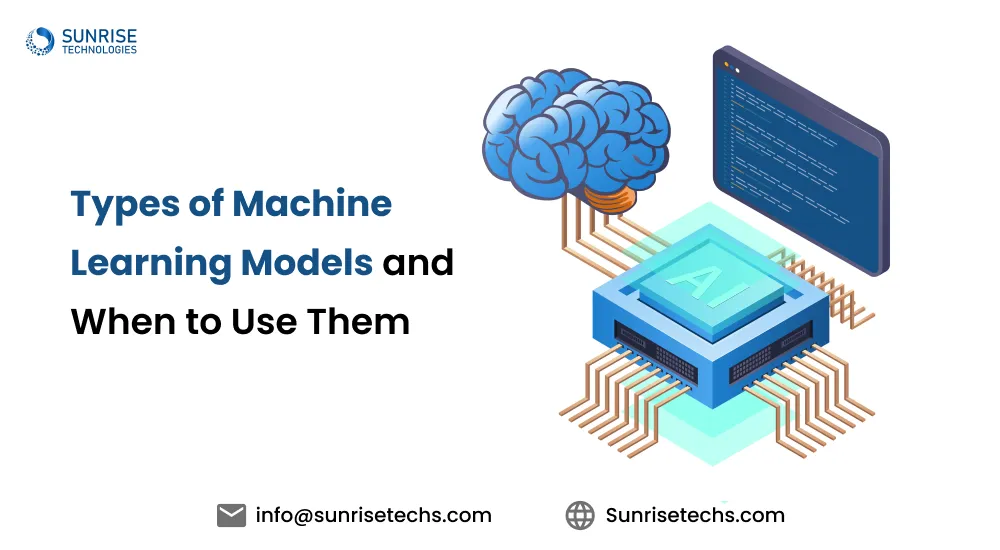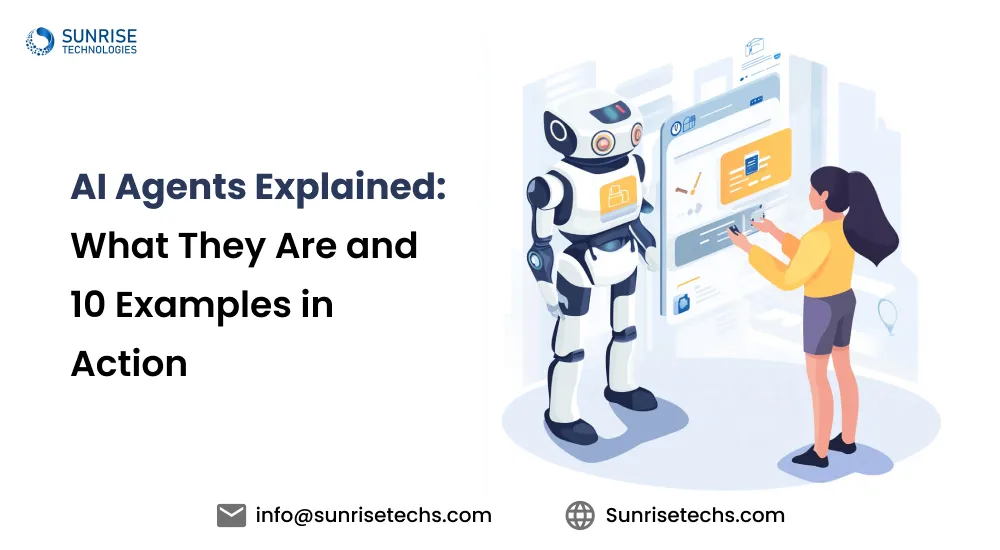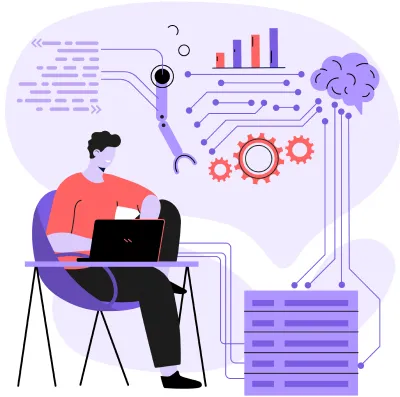Top AI Use Cases and Applications Across Industries
May 21, 2025
Artificial Intelligence (AI) is quickly becoming a driving force behind digital transformation across industries. In fact, McKinsey highlights that businesses that integrate AI can experience a 20–30% boost in operational efficiency. AI is already making waves in healthcare, finance, and retail,and AI helping doctors with faster, more accurate diagnoses or enabling retail businesses to create personalized shopping experiences for customers. This technological leap is changing the game when it comes to decision-making, innovation, and how businesses engage with customers.
But that’s not all, according to recent studies, AI could add as much as $15.7 trillion to the global economy by 2030. This growth is fueled by AI’s ability to increase productivity, cut costs, and open new avenues for revenue generation. As AI keeps evolving, it’s becoming more essential to business operations, helping companies unlock new efficiencies and opportunities that were once out of reach.
This comprehensive guide will delve into the most intriguing question, how AI is transforming different industries, providing detailed examples and exploring the exciting future of this powerful technology.
Benefits of AI Used in Business
Artificial Intelligence is influencing practical applications of AI in business, from decision-making and automation to customer engagement and predictive analytics. It’s not just about cutting costs or speeding up tasks, AI empowers companies to unlock deeper insights, adapt to changing market dynamics, and deliver smarter, data-driven solutions across every department. Now let’s see how AI is used in business and why?
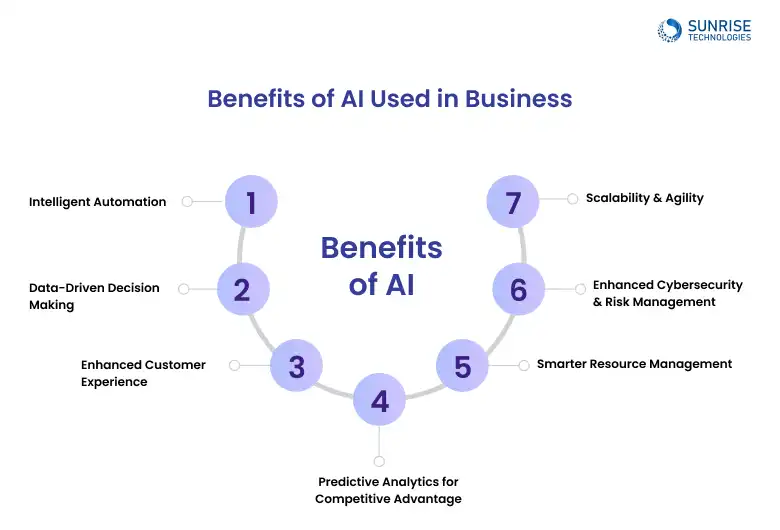
Let’s explore the core benefits of AI in business and how it’s enabling smarter operations, sharper strategies, and seamless experiences.
AI streamlines repetitive and time-consuming tasks such as data entry, invoice processing, and customer onboarding through technologies like Robotic Process Automation (RPA) and Machine Learning (ML). This reduces operational costs, minimizes human error, and increases speed and accuracy, freeing up teams for strategic, value-added work.
AI systems can analyze vast datasets in real-time to uncover trends, patterns, and anomalies. With predictive modeling, businesses gain actionable insights for everything from sales forecasting to inventory planning.
AI personalizes customer interactions through chatbots, recommendation engines, and dynamic content delivery. Tools like Natural Language Processing (NLP) enable AI to understand and respond to user intent, making support systems faster and more human-like.
AI leverages historical and real-time data to forecast demand, detect fraud, predict equipment failures, or optimize marketing campaigns. Businesses that embrace AI-powered predictions can proactively address issues, capitalize on opportunities, and stay ahead of market trends with precision.
From supply chain optimization to workforce planning, AI helps allocate resources efficiently by analyzing consumption patterns, production rates, and delivery timelines. Algorithms can predict when and where resources are needed most, reducing wastage and maximizing operational efficiency.
AI plays a critical role in real-time threat detection and fraud prevention. Machine learning algorithms monitor activity patterns, flag unusual behavior, and even autonomously respond to security breaches offering a smarter, faster approach to cybersecurity and compliance.
AI for scaling small businesses without linear increases in manpower or infrastructure. Whether it’s handling millions of customer queries or analyzing terabytes of data, AI solutions adapt and evolve with business needs ensuring agility in a fast-changing landscape.
Read Also: How Business are using Generative AI
AI Use Cases Across Various Industries
Artificial Intelligence is enabling breakthrough transformation across multiple domains. With the growing adoption of AI across various industries, organizations are leveraging advanced machine learning solutions to streamline processes, cut costs, and create intelligent customer experiences. These real-world use cases of artificial intelligence highlight how AI applications in different sectors are driving innovation and long-term value.
- Medical Imaging Interpretation Deep learning algorithms interpret MRIs, CT scans, and X-rays with higher accuracy and speed, helping radiologists detect anomalies. These models are trained on vast image datasets, allowing them to recognize patterns and abnormalities that may be missed by the human eye.
- Electronic Health Record (EHR) Analysis Natural Language Processing (NLP) systems structure unstructured EHR data, enabling clinicians to quickly access vital insights. This enhances clinical decision-making by identifying patient histories, allergies, and treatment patterns more effectively.
- Predictive DiagnosticsMachine learning predicts patient risks like sepsis or cardiac arrest, aiding early intervention and personalized care. These models leverage historical patient data, vital signs, and lab results to forecast clinical deterioration.
- Virtual Patient AssistantsAI chatbots offer appointment scheduling, medication reminders, and health tracking, improving patient engagement. They use NLP to interact with users and integrate with medical databases for real-time assistance.
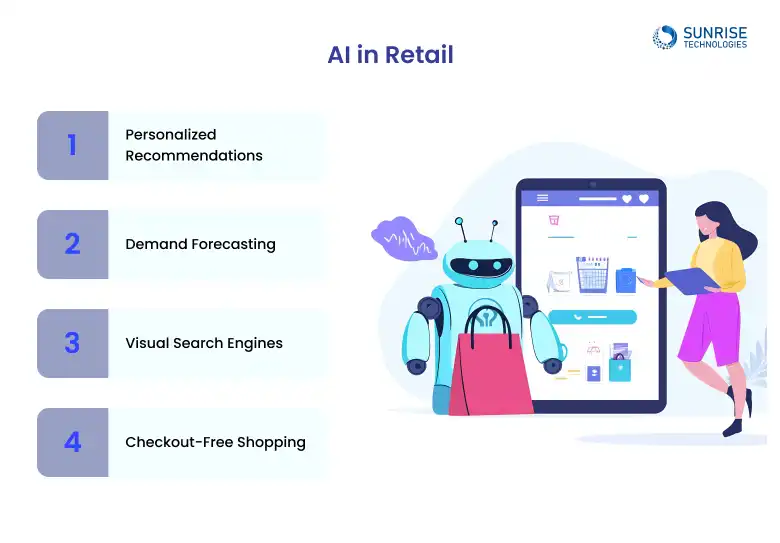
- Personalized Recommendations Models like Neural Collaborative Filtering, Matrix Factorization, and content-based filtering analyze user behavior and purchase history to deliver hyper-personalized suggestions, boosting conversions and user engagement.
- Demand Forecasting Retailers use LSTM networks, ARIMA, and Prophet models to predict demand trends by analyzing past sales, seasonal shifts, and external factors, helping optimize stock and reduce losses.
- Visual Search Engines Using convolutional neural networks (CNNs), AI enables image-based product search, improving discovery and making shopping more intuitive and visually driven.
- Checkout-Free Shopping AI in Retail enables cashier-less experiences through real-time object detection and automated billing. Cameras, sensors, and AI models work in tandem to track items and handle transactions seamlessly.
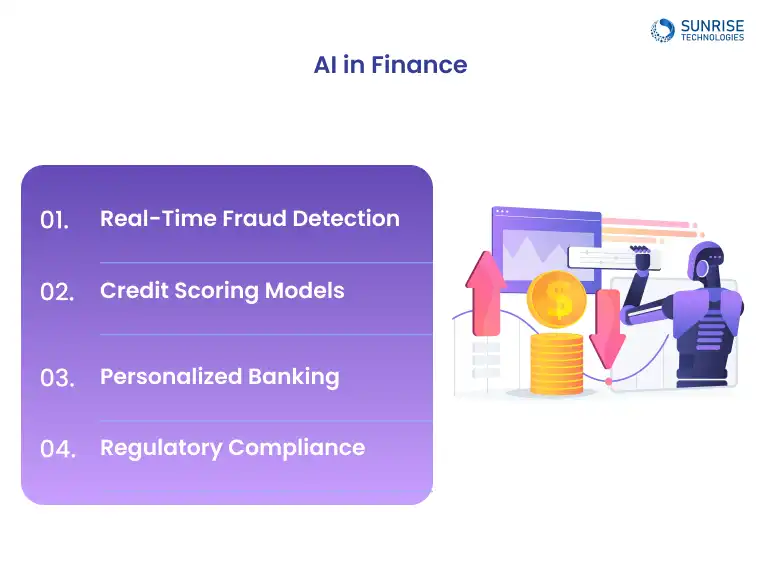
- Real-Time Fraud Detection For AI in Finance, Models like Isolation Forest, Autoencoders, and XGBoost are used to detect anomalies and unusual patterns in real-time, helping flag fraudulent transactions based on behavioral analytics.
- Credit Scoring Models AI models such as Gradient Boosting Machines (GBM), Random Forests, and Logistic Regression integrate alternative data like transaction behavior and digital footprints to improve credit assessments.
- Personalized Banking Natural Language Processing (NLP) models like BERT, GPT, and intent classification models power chatbots and virtual advisors to deliver personalized financial support and product suggestions.
- Regulatory Compliance Tools powered by rule-based AI, transformer-based NLP models like RoBERTa, and Named Entity Recognition (NER) automate document scanning and flag non-compliance, ensuring adherence to regulations.
- Sensor-Based Monitoring IoT sensors collect real-time machine health data like vibration, temperature, and pressure. AI processes this data to identify wear patterns and schedule preventive actions.
- Failure Prediction Models Machine learning algorithms analyze historical failure logs to predict potential breakdowns. These models minimize downtime by alerting maintenance teams ahead of time.
- Process Optimization AI evaluates workflow inefficiencies and suggests adjustments to boost output. Reinforcement learning and digital twin simulations are often used for continuous improvement.
- Quality Control Computer vision systems monitor production lines for surface defects and dimensional inconsistencies. Real-time defect detection improves yield and reduces rework costs.
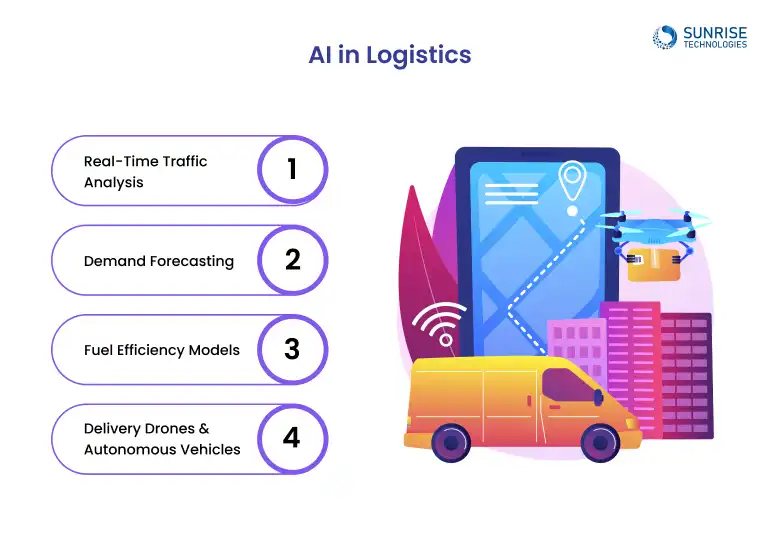
- Real-Time Traffic Analysis Recurrent Neural Networks (RNNs) and Convolutional Neural Networks (CNNs) process real-time GPS and sensor data to predict and reroute vehicles, optimizing delivery efficiency based on live traffic conditions.
- Demand Forecasting Time Series Forecasting Models like ARIMA, LSTM (Long Short-Term Memory networks), and XGBoost help predict future shipping needs by analyzing historical data, seasonality, and customer behavior to optimize inventory and resource planning.
- Fuel Efficiency Models Reinforcement Learning (RL) and Decision Trees are applied to driving pattern data to optimize routes for fuel efficiency, minimizing consumption and reducing environmental impact.
- Delivery Drones & Autonomous Vehicles Deep Learning models like YOLO (You Only Look Once) for object detection and SLAM (Simultaneous Localization and Mapping) enable real-time navigation, obstacle avoidance, and efficient path planning for drones and autonomous vehicles.
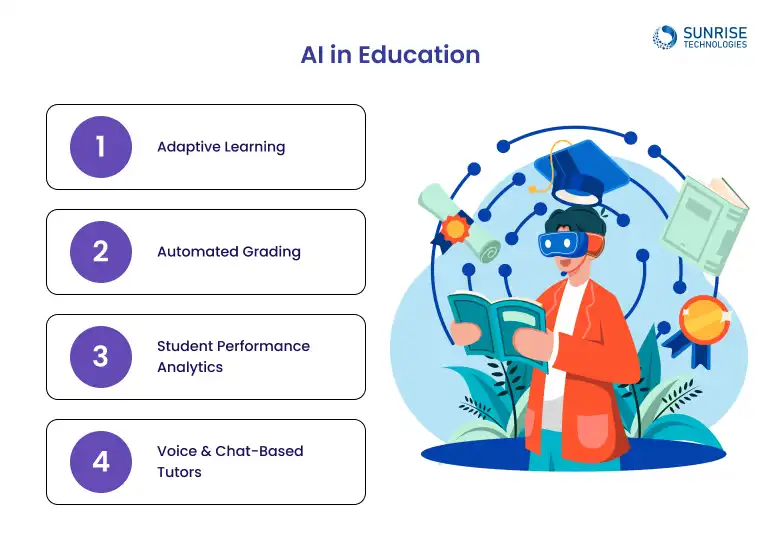
- Adaptive Learning AI in education personalize learning materials based on student performance and preferences. These systems adjust content difficulty in real-time to maximize retention.
- Automated Grading AI tools automatically evaluate assignments and quizzes, reducing the administrative burden on educators. NLP and image recognition are used for both subjective and objective assessments.
- Student Performance Analytics Predictive models analyze attendance, test scores, and engagement to identify at-risk students. Early interventions can then be deployed to improve learning outcomes.
- Voice & Chat-Based Tutors AI-powered virtual tutors provide real-time assistance through voice and text. These NLP-driven tools enhance student support beyond classroom hours.
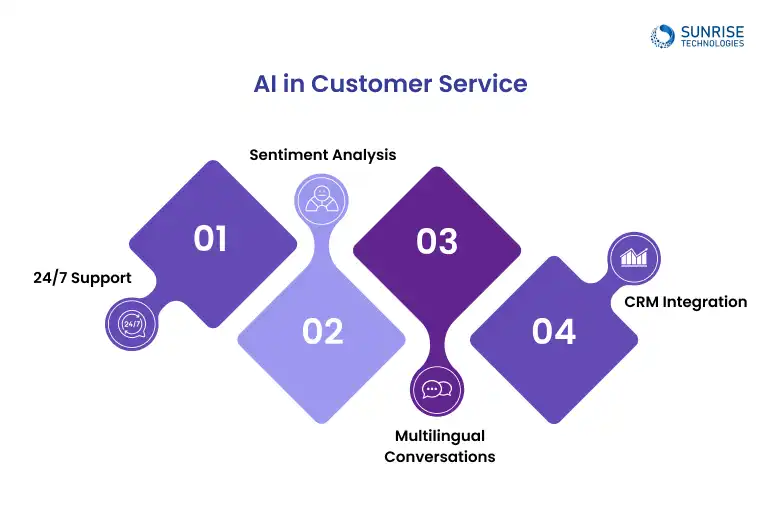
- 24/7 Support AI chatbots handle customer queries around the clock, providing instant assistance. This ensures operational continuity and improves service quality.
- Sentiment Analysis AI evaluates the emotional tone of customer messages to route complaints or escalate issues. This helps businesses respond empathetically and prioritize urgent cases.
- Multilingual Conversations AI-powered chatbots support multiple languages, enabling global customer engagement. NLP models are trained to understand diverse linguistic nuances.
- CRM Integration AI chatbots integrate with Customer Relationship Management (CRM) systems to retrieve customer history. This allows agents to provide personalized solutions efficiently.
- Crop Health Monitoring Computer vision and drone imagery are used to detect early signs of pests and diseases. This allows for timely interventions and reduces crop loss.
- Weather Prediction AI models aggregate and analyze meteorological data to forecast weather patterns. Farmers can make informed decisions about irrigation and harvest timing.
- Soil Quality Analysis AI in agriculture analyze soil imagery and sensor data to assess nutrient composition. Precision agriculture tools help in determining the right fertilizer mix.
- Yield Prediction Machine learning models estimate future crop yields based on historical and environmental data. This aids in market planning and resource allocation..
- Grid MonitoringAI analyzes sensor data to detect faults and forecast outages in power grids. These predictive insights enable proactive maintenance and energy stability.
- Energy Demand Forecasting Machine learning algorithms model historical consumption to predict future demand. Utilities use these forecasts to balance load and prevent overcapacity.
- Smart Meter Analytics AI deciphers data from smart meters to track consumption behavior and detect anomalies. This supports personalized energy-saving recommendations.
- Renewable Energy Optimization AI fine-tunes the performance of solar panels and wind turbines based on environmental variables. These systems ensure optimal power generation and storage management.
- Document Review Natural Language Processing (NLP) scans legal documents to extract relevant information and detect risks. This accelerates due diligence and contract review processes.
- Contract Analysis AI identifies critical clauses, inconsistencies, and obligations in complex contracts. It enables legal teams to reduce manual review time and improve accuracy.
- Predictive Legal Outcomes Machine learning models analyze past case law and legal data to predict trial outcomes. These tools support attorneys in litigation planning and risk assessment.
- Compliance Automation AI monitors transactions and communications to flag potential regulatory breaches in real-time. Automated compliance tools ensure organizations stay audit-ready.
- Demand Forecasting Machine Learning Models like Random Forest, XGBoost, and LSTM (Long Short-Term Memory networks) analyze historical sales, market trends, and seasonal factors of AI in supply chain to predict future demand accurately, leading to optimized production and inventory management.
- Supply Chain Visibility Recurrent Neural Networks (RNNs) and Convolutional Neural Networks (CNNs), along with Predictive Analytics models, help optimize route planning and provide real-time tracking for goods. These AI models also anticipate disruptions, such as weather or geopolitical risks, enhancing proactive decision-making.
- Inventory Management Reinforcement Learning (RL) and Deep Neural Networks (DNNs) are used to monitor stock levels in real time, automate the reordering process, and ensure optimal stock levels without overstocking, significantly reducing costs and improving overall efficiency.
- Smart Logistics AI-powered Route Optimization Models like Genetic Algorithms and Ant Colony Optimization help optimize delivery routes, while Computer Vision and SLAM (Simultaneous Localization and Mapping) models enable autonomous vehicles and drones to navigate efficiently, reducing fuel consumption and improving fleet management.
- Candidate Screening AI tools sift through resumes and cover letters, applying natural language processing (NLP) to identify the most suitable candidates based on keywords, skills, and experiences. The AI in hiring, significantly reduces the time spent on manual screening.
- Interview Assistance AI-driven chatbots conduct initial interviews, assessing candidates’ skills, experiences, and cultural fit before forwarding the most promising candidates for further evaluation by hiring managers.
- Predictive Hiring Machine learning models predict which candidates are most likely to succeed in a given role by analyzing past hiring decisions, employee performance data, and other relevant metrics.
- Diversity and Inclusion AI algorithms help eliminate bias by ensuring hiring decisions are based on relevant skills and experiences, promoting diversity by mitigating unconscious biases in the recruitment process.
- Property Valuation AI models like Linear Regression and Random Forest analyze market data and property trends to provide precise valuations. These models help buyers and sellers make more informed, data-driven decisions in real estate transactions.
- Smart Property Management Predictive Maintenance Models, such as Random Forest, use data to foresee potential building issues, minimizing costly repairs. AI optimizes energy consumption and schedules maintenance efficiently to improve operational effectiveness.
- Virtual Tours and Chatbots Convolutional Neural Networks (CNNs) power AI-driven virtual tours, allowing remote exploration of properties. NLP models enhance the user experience by providing instant answers and addressing queries through chatbots.
- Real Estate Investment Insights Models like ARIMA and LSTM forecast investment opportunities by analyzing market trends and historical data. These models help investors identify high-potential properties and optimize their real estate portfolios.
- Predictive Maintenance Random Forest and Support Vector Machines (SVM) analyze data from IoT sensors to predict machine failures. These AI models enable timely maintenance, minimizing downtime and reducing operational costs.
- Smart Homes Reinforcement Learning (RL) and Deep Neural Networks (DNNs) allow AI to personalize home automation systems, adjusting them based on user behavior. These models improve convenience and optimize energy consumption across smart devices.
- Energy Management K-means Clustering and Gradient Boosting Machines (GBM) are used to analyze energy consumption patterns from IoT devices. These models help reduce energy waste by optimizing usage, contributing to cost savings and sustainability goals.
- Connected Healthcare Devices Convolutional Neural Networks (CNNs) and Long Short-Term Memory (LSTM) networks process real-time data from wearable devices. These models help detect health anomalies and alert healthcare professionals for immediate intervention, enhancing patient care.
- Personalized Guest Services AI-driven systems analyze guest preferences and past interactions to offer tailored recommendations, such as room settings, dining options, and activities. Chatbots and virtual assistants enhance the guest experience by providing instant, on-demand support.
- Dynamic Pricing AI uses algorithms to dynamically adjust room rates based on factors like demand, competitor prices, and booking patterns. This helps hospitality businesses maximize occupancy and revenue while ensuring competitive pricing.
- Operational Efficiency AI automates routine tasks in travels and tourism like check-in/check-out, room cleaning schedules, and inventory management. By optimizing operations, hotels can provide faster, more efficient services while reducing overhead costs.
- Customer Sentiment Analysis AI analyzes guest feedback from reviews, social media, and surveys to understand guest sentiment. This helps identify areas for improvement, enabling businesses to enhance their services and increase customer satisfaction.
Our expert team at Sunrise Technologies can help you identify and deploy the right AI applications.
How to Implement AI in Business Effectively?
Successfully implementing AI in your organization requires a strategic and technically grounded approach. Here are the essential steps:
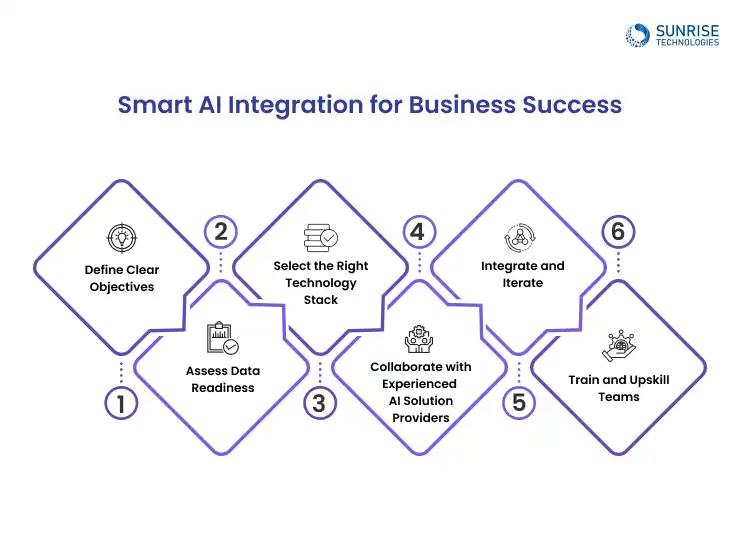
Start by identifying measurable business goals. Whether it’s reducing operational costs, enhancing customer experience, or increasing productivity, AI should be aligned with tangible outcomes. Clear KPIs (Key Performance Indicators) will guide technology deployment and ensure ROI.
Data is the fuel for AI. Evaluate the availability, structure, and quality of your data across departments. Implement data governance protocols and consolidate data sources to enable AI algorithms to generate reliable insights.
Choose appropriate AI frameworks and tools depending on the project scope:
- TensorFlow: Ideal for deep learning and neural networks.
- PyTorch: Suitable for research-oriented and dynamic model development.
- Scikit-learn: Great for traditional ML models like regression and clustering.
- Apache Spark + MLlib: Scalable for big data processing and distributed machine learning.
Partner with experts like Sunrise Technologies to bridge the gap between AI concepts and practical implementation. AI service providers bring domain-specific expertise, technical resources, and execution frameworks to accelerate development.
Start small, develop pilot models, evaluate their performance, and scale gradually. Integrate AI into existing systems (e.g., ERP, CRM) via APIs or microservices. Use MLOps (Machine Learning Operations) practices to manage lifecycle, version control, monitoring, and model retraining.
Equip internal teams with knowledge on AI tools, data handling, and ethical considerations. Encourage collaboration between domain experts and data scientists to ensure business relevance.
The Future of AI Across Industries
As AI technologies mature, the future points to deeper and more pervasive integration across every major sector. Key trends shaping the next wave of AI innovation include:
Future AI systems will process and interpret data across multiple modalities like text, image, voice, video, and sensor data in real time. This enables AI industry applications like context-aware digital assistants, autonomous monitoring, and immersive virtual environments.
Advancements in reinforcement learning and edge AI will drive autonomous systems in logistics, manufacturing, and defense. These systems will operate with minimal human intervention, improving speed, precision, and adaptability in complex environments.
AI will play a central role in sustainability, optimizing energy usage, reducing waste, and accelerating carbon-neutral goals. Predictive modeling and intelligent automation will help industries achieve environmental compliance while reducing costs.
Expect AI solutions tailored for niche domains from legal contract parsing to genomic drug discovery. As domain-specific datasets become more available, AI systems will deliver hyper-personalized insights and automation.
We craft smart AI chatbots that work for your brand, your users, and your bottom line.
How Sunrise Technologies Helps to Implement AI in Various Industries
So, everyone prefers AI to ease and automate their work, but if you’re just starting up or even running a large enterprise, you might be wondering: Is there an affordable AI development company or a scalable AI app development company that can deliver the solutions you need? The answer is yes, but with many options, the confusion can be overwhelming and there is one solution Sunrise Technologies.
At Sunrise Technologies, we specialize in building custom AI solutions for small businesses tailored to your unique business needs. Whether you’re a startup looking for cost-effective AI development or a scalable AI apps for enterprises, we provide the expertise to drive innovation, enhance efficiency, and deliver measurable results.
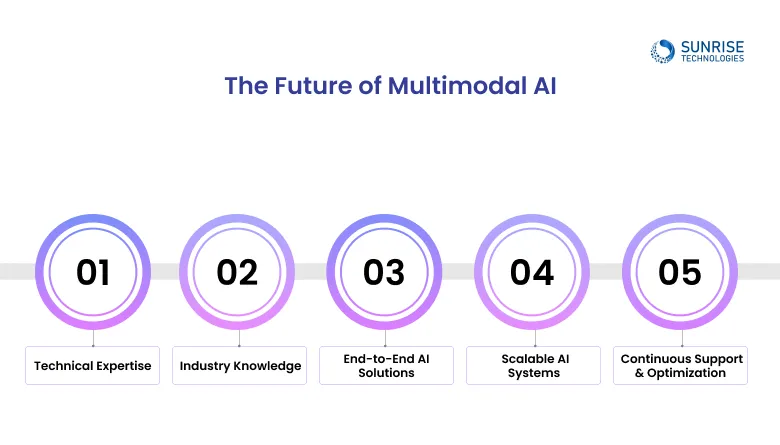
1. Technical Expertise
We leverage advanced machine learning (ML), natural language processing (NLP), and computer vision technologies to create intelligent systems tailored to your business needs. Our team’s expertise and you will just know how to integrate AI into existing products AI seamlessly with our solutions.
With years of experience across industries like healthcare, manufacturing, retail, and finance, we understand the unique challenges each sector faces. By combining our AI capabilities with in-depth industry knowledge, we develop solutions that address specific pain points and drive sector-specific value.
From data engineering to AI deployment, we handle the entire lifecycle. Our full-stack AI implementation ensures that businesses can seamlessly adopt affordable AI tools for startups without the hassle of integration or maintenance.
Our solutions are designed to scale with your business. Whether you need to process massive datasets or deploy across multiple locations, our scalable AI infrastructure ensures reliability, performance, and long-term growth.
AI implementation doesn’t stop at deployment. We provide ongoing AI model optimization and maintenance services, ensuring that your systems evolve with changing data and industry trends, continuously improving over time.
Artificial Intelligence becoming a practical, transformative force that’s reshaping industries across the globe. From precision-driven healthcare to predictive retail, intelligent manufacturing, and agile finance, and other real-world AI examples, we can see AI continues to revolutionize how businesses operate, compete, and grow. As businesses look to stay competitive, the demand for AI-powered solutions tailored to specific industry challenges has never been higher.
At Sunrise Technologies, we delive RAI adoption for startups, custom AI solutions for business process automation and industry needs. With expertise in machine learning, NLP and computer vision, we build scalable and secure AI systems from strategy to deployment. Partner with us to harness AI and drive innovation across your industry.
Looking to implement AI in your business? Collaborate with a trusted AI development partner to design and deploy solutions that align with your goals and deliver measurable impact.
Partner with Sunrise Technologies for expert guidance and tailored Artificial intelligence applications.
AI assists in detecting diseases using medical imaging, analyzing EHRs, and forecasting patient risks using predictive modeling.
Product recommendations, dynamic pricing, visual search, and inventory optimization are top AI-driven retail solutions.
Machine learning models flag anomalies in real time, enhance credit scoring, and automate compliance tracking.
AI is transforming every major industry with powerful, real-world applications. Here are some of the top use cases:
- AI in Healthcare
- AI in Retail
- AI in Manufacturing
- AI in Finance
- AI in Logistics
- AI in Education
- AI in Agriculture
- AI in Real Estate
- AI in Transportation
- AI in Marketing
They provide 24/7 assistance, sentiment analysis, and seamless CRM integration for personalized support.
Sam is a chartered professional engineer with over 15 years of extensive experience in the software technology space. Over the years, Sam has held the position of Chief Technology Consultant for tech companies both in Australia and abroad before establishing his own software consulting firm in Sydney, Australia. In his current role, he manages a large team of developers and engineers across Australia and internationally, dedicated to delivering the best in software technology.



